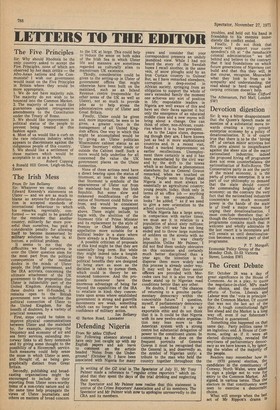The Irish Mess
From Dr Ian Bellamy
Sir: Whatever we may think of Edward Kennedy's statements on Ulster — and we are as much to blame as anyone for the deterioration in accepted standards of international behaviour to which his remarks, regrettably, conformed — we ought to be grateful for the reminder that another country, militarily far more powerful than ourselves, has paid a considerable penalty for allowing itself to become mesmerised by military solutions to what is, at bottom, a political problem.
It seems to me that the difficulties we find ourselves in over the Ulster question stem for the most part from the political consequences of the residual doubts in the minds of Ulster people, the Irish government, and the IRA activists, concerning the ultimate attachment of the UK government to the proposition that Ulster is indissolubly part of the United Kingdom. Assuming that these doubts are ill-founded, it remains open to the British government now to underline the political connection of Ulster to the United Kingdom, for the benefit of doubters, by a variety of practical measures. First, steps could be taken to improve physical communications between Ulster and the mainland by, for example, improving the frequency and economy of air and sea ferry services, extending mo torway links to all ferry terminals and by giving some thought to the possibility of a Hovercraft service. Such measures could help erase the sense in which Ulster is seen, and thought of, as being geographically distinct from Great Britain.
Secondly, publishing and broadcasting organisations might be encouraged to include in their reporting from Ulster news-worthy items of a non-crisis nature and at the same time help propagate the views of Ulster journalists and others on matters of broad concern to the UK at large. This could help to reduce the sense on both sides of the Irish Sea in which Ulster life and manners are sometimes regarded as culturally alien to mainstream UK existence.
Thirdly, consideration could be given to the setting-up in Ulster of government offices that might otherwise have been built on the mainland, such as an Inland Revenue centre (responsible for other areas of the UK as well as Ulster), not so much to provide jobs as to help stress the administrative unity of Ulster and Great Britain.
Finally, Ulster could be given and, more important, be seen to be given, a greater voice in the management of all United Kingdom affairs. One way in which this might be accomplished would be by giving an Ulster politician Westminster cabinet status as an ' Ulster Secretary' either inside or outside the Cabinet itself. Such a move would help underline for all concerned the value the UK government places on the Ulster connection.
None of these actions need have a direct bearing upon the status of Stormont, at least to the extent that Stormont is symbolic of the separateness of Ulster not from the mainland but from the Irish Republic. But some slow and measured modifications of the status of Stormont could follow on from, and would be consistent with, the measures suggested above. These might include, to begin with, the abolition of the Stormont title of Prime Minister and its replacement by the style of Premier or Chief Minister, an appellation more suitable for a political leader in a state where there already is a Prime Minister.
A possible criticism of proposals of this kind might be that they are essentially long term. But while they might indeed take a longish time to bring to fruition, the political benefits they are designed to bring start as soon as the decision is taken to pursue them, which could in theory be announced tomorrow. And the proposals moreover have the enormous advantage of being far beyond the capabilities of the IRA to retaliate in kind; they concentrate upon areas where established government is strong and guerrilla movements are weak, something which can no longer be said with confidence of military action.
Ian Bellamy 42 Barton Road, Lancaster














































 Previous page
Previous page